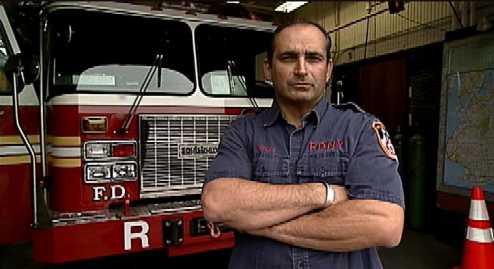

Reviews of Recent Independent, Foreign, & Documentary Films in Theaters and DVD/Home Video
Directed, Produced, & Director of Photography by: Etienne Sauret. Edited by: Emily Gumpel. Music by: Stuart Dempster & Stephen Vitiello. Released by: Turn of the Century/Emerging. Country of Origin: USA. 60 min. Not Rated.
THE FIRST 24 HOURS
To the entire world, they were heroes. But a year after the terrorist attacks on September 11,
2001, the firefighters of New York City are still afflicted, able to recall with graphic detail the
tragedy’s horrific images like it was yesterday. The filmmaker spent a year in the firehouses
closest to the World Trade Center, following the firefighters' psychological and emotional
journeys in the aftermath of 9/11. He allows his subjects to speak in their own words without
narrative devices. There are no shots of the burning towers, no footage of the final collapse.
Instead, there are long, tense pauses in speech, extreme close-ups of men that drift in and out of
frame, recurring shots of fire trucks being demolished, and silent, empty streets. This is,
ultimately, what separates Collateral Damages from other 9/11 films. Sauret has found
the most powerful way to address the trauma of an event that cannot simply be conveyed by
replaying familiar footage over and over again. In both the subjects' vivid descriptions and their
unspoken emotions, the film manages to avoid sentimentality and confront the effects of physical
and psychological disaster. It is in the seeming emptiness of a man's gaze and the way he says, "I
think I'm all right," even when his eyes say otherwise, that reveal the truth of emotional fallout: it
never disappears. The First 24 Hours is composed of photojournalistic video imagery of Ground Zero in the
immediate aftermath of the 9/11 terrorist attacks. Although there are rare instances of dialogue,
the film may as well be silent since the harrowing images speak for themselves. It begins with
footage of the towers falling, leaving behind a dense gray cloud of smoke, and ends on a desolate
note with a solitary firefighter standing atop a pile of debris as his "hello" echoes across a
flattened landscape. Kim Reyes, contributing editor
|